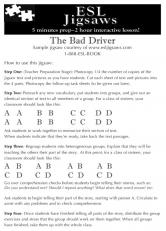ESL Jigsaws
5 Minutes Prep - 2 Hour Interactive Lesson!
Decorate Your Classroom with Affirmations
If you have been off for the summer or part of it, soon it will be time to return to classes. Maybe you are thinking about decorating your classroom. Why not give it a makeover with some affirmations? Our subconscious mind is bombarded with so many messages throughout the day, many of them negative. Affirmations give your subconscious mind new more positive messages to believe in. They literally re-program the mind.
Telephone Voice Mail Messages
Many new immigrants answer the phone in their own language. A Korean immigrant might answer, "Yabusayo?" A Chinese immigrant might answer, "Wei?" Often their thinking is that most people who call them speak their language anyway and those who don't will understand that they are simply answering in their own language.
Using Go, Play and Do with Activities
Summer is the natural time for a unit on leisure. This unit is suitable for ESL or EFL students of all levels and has many opportunities for fieldtrips. Low beginners can learn the names of activites and practice "can" and "can't". "I can dance." "I can't dance." Higher level students can practice the intricate soft skills required to politely navigate invitations, both in speaking and in writing. Email is an obvious medium for invitations.
Soft Skill: Who Picks Up the Bill?
We often think of bargaining language as confined to situations like a garage sale or to the purchase of larger items like cars or homes. One of the most common negotiations most people will engage in at some point is who will pay the bill in a restaurant. Not only are there language and soft skills specific to this situation, many cultural assumptions are thrown into the mix. Countries, as well as the cultures within them, differ in their norms about who should pick up the tab and when. Learning the related idioms and other bargaining language but not cracking this cultural code and developing the soft skills to successfully navigate this interaction can lead to social awkwardness as exemplified in the story below.
Murder in the Parking Garage
In 2011 I wrote about teaching about death in the ESL / EFL / ELL classroom. Students know that they need the soft skills required to respond to news about a death. The Widow jigsaw in Contemporary Jigsaws 1 and 2 works as an effective springboard for this topic. While it focuses on the passive voice, there’s lots of scope for other grammar points. Here’s a suggestion of some follow up activities. Start with explaining the differences between the following and you will have students full attention:
Environmental Jigsaw for Higher Levels
When choosing a jigsaw that is appropriate for the level of your class, it’s important to remember that jigsaws are not passive reading exercises. These four skills lessons require the students to not only read their part, but to teach it to their classmates. Pronunciation and listening skills are key.
Coins and Bills for Low Beginners
As tax season approaches, we often teach a unit on money. With low beginners, I structure my unit around learning numbers, counting, asking and saying prices, the names of bills and coins, and finally the task of asking for change. I've put together some exercises for Canadian and American teachers on asking for change.
Collective Nouns for Animals for Intermediate Level
I've taken a moment to make a test of English for you, the ESL or EFL teacher, for fun! Let's see how well you do! Simply choose the correct collective noun.
Charter of Rights and Freedoms
Discussion of the Canadian Charter of Rights and Freedoms can make for an interesting lesson in an intermediate ESL class. Students often assume freedom of expression is the right to say anything about any person or about the government. Here’s where you can let them know about libel laws and Canada’s Hate Speech Laws. Unlike the United States, the Criminal Code of Canada prevents “hate propaganda”. Is this a good thing? Why do we have those laws?
Fieldtrip to the Dentist
In adult immigrant ESL classes, within a health unit, many teachers touch on the subject of dental care. I highly recommend a visit to an actual dentist’s office, if you can arrange it. My dentist Dr. Marcy Schwartzman was kind enough to allow a visit to her dental clinic for my intermediate ESL students, many of whom had never been to a dentist in their lives.


